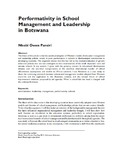| dc.contributor.author | Pansiri, N.O. | |
| dc.date.accessioned | 2013-02-07T06:54:18Z | |
| dc.date.available | 2013-02-07T06:54:18Z | |
| dc.date.issued | 2011-11 | |
| dc.identifier.citation | Pansiri, N.O. (2011) Performativity in school management and leadership in Botswana, Educational Management Administration and Leadership, Vol. 39, No. 6, pp. 751-766. | en_US |
| dc.identifier.issn | 1741-1432 | |
| dc.identifier.uri | http://hdl.handle.net/10311/1116 | |
| dc.description.abstract | The thesis of this article is that the uncritical adoption of Western models of education management and leadership policies results in poor performance in schools in disadvantaged communities in developing countries. The argument shows that this has led to the institutionalizationof generic education policies that are not contingent to the circumstances of the small, dispersed, rural and remote schools. In my analysis, I agree with the growing concern in educational development debates over the uncritical transportation or the uncritical international transfer of school effectiveness assumptions and models to African contexts. I use Botswana as a case study to show the continuing mismatch between educational management models adopted from Western countries and the application in the Botswana context, and the related failure of school improvement initiatives proposed by aid agencies. When a school fails the head is charged with the underperformance. | en_US |
| dc.language.iso | en | en_US |
| dc.publisher | EMAL, http://ema.sagepub.com | en_US |
| dc.subject | Administration | en_US |
| dc.subject | Leadership | en_US |
| dc.subject | Management | en_US |
| dc.subject | Performativity | en_US |
| dc.subject | Schools | en_US |
| dc.title | Performativity in school management and leadership in Botswana | en_US |
| dc.type | Published Article | en_US |
| dc.link | http://ema.sagepub.com/content/39/6/751 | en_US |

